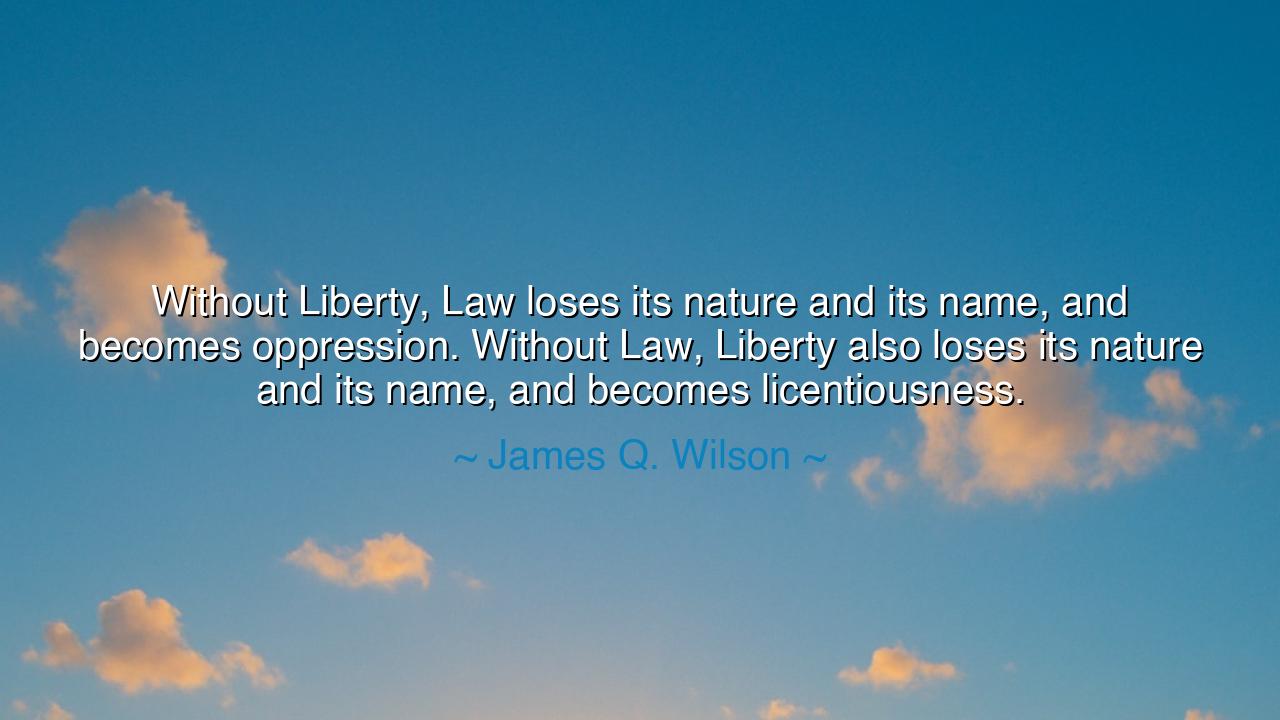
Without Liberty, Law loses its nature and its name, and becomes
Without Liberty, Law loses its nature and its name, and becomes oppression. Without Law, Liberty also loses its nature and its name, and becomes licentiousness.






Hear, O seekers of truth, the solemn words of James Q. Wilson: “Without Liberty, Law loses its nature and its name, and becomes oppression. Without Law, Liberty also loses its nature and its name, and becomes licentiousness.” This is no passing thought, but a teaching forged in the furnace of history. In these words we see the eternal tension between Law and Liberty, those twin guardians of civilization. Each without the other becomes a tyrant; only in their balance do they give birth to justice.
Consider first the fate of Law without Liberty. Law, when stripped of freedom, ceases to be a guide and becomes a chain. It becomes not the protector of the weak, but the tool of the strong. Under despotism, laws still exist—but they no longer carry the spirit of justice. They serve not the people, but their masters. Think of the reign of the czars in Russia, or of countless monarchies where decrees fell like iron upon the backs of the people. Law remained, but it was hollow, no longer a servant of right but an instrument of oppression.
Now turn your eyes to the opposite danger: Liberty without Law. Here freedom grows wild, no longer disciplined by justice or duty. Such liberty ceases to be noble; it becomes selfishness, chaos, licentiousness. The French Revolution began with the cry of liberty, yet when law collapsed, the streets ran red with terror. What began as liberation descended into violence, because liberty without order has no anchor. Like a fire uncontained, it consumes all in its path.
History gives us a shining example of balance in the founding of the United States. The framers of the Constitution knew the lesson Wilson speaks. They had seen tyranny in the British crown, and they feared anarchy if unchecked liberty reigned. Thus they bound the two together: Law to restrain liberty from destroying itself, Liberty to restrain law from hardening into tyranny. The Bill of Rights guaranteed freedom, while the Constitution established rules. Together, they formed not oppression, nor chaos, but a system striving toward justice.
The lesson is this: true society demands both discipline and freedom, both structure and spirit. To cling only to Law makes us slaves; to cling only to Liberty makes us reckless. It is the harmony of the two that allows men and women to flourish. The wise ruler, the good citizen, the just teacher—all must hold this balance in their hearts, lest they fall to one extreme or the other.
Practical action follows. As citizens, respect the Law, for it is the framework that protects your freedom. But also guard your Liberty, lest the law grow heavy and unjust. Speak when laws are corrupt; obey when laws are just. Live as one who honors both freedom and order. In your own life, balance discipline and joy, responsibility and spontaneity, so that you may walk in harmony with the rhythm of existence.
Thus remember, O children of tomorrow: Law without Liberty is tyranny; Liberty without Law is chaos. Only in their union is true freedom born. Carry this teaching in your heart, and you shall not be swayed by the cries of despot or demagogue. Walk the middle path, where law protects and liberty uplifts, and you will preserve both your soul and your society.






AAdministratorAdministrator
Welcome, honored guests. Please leave a comment, we will respond soon